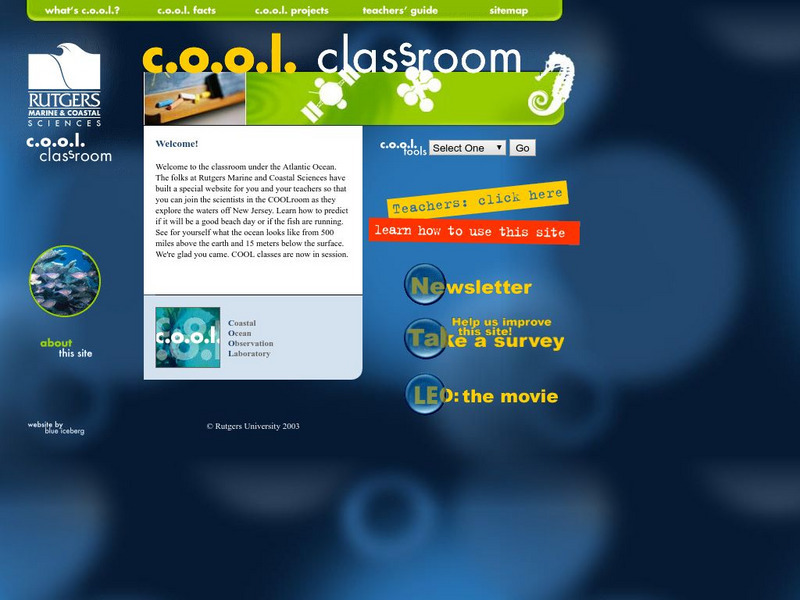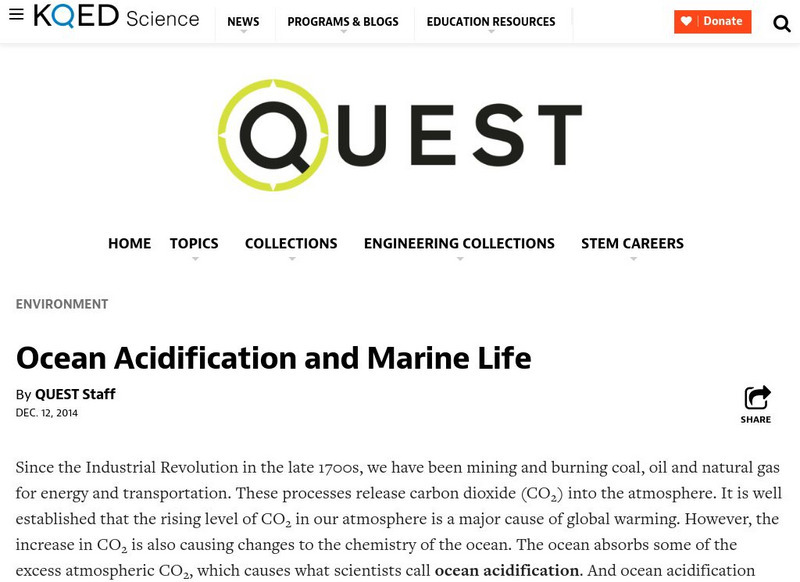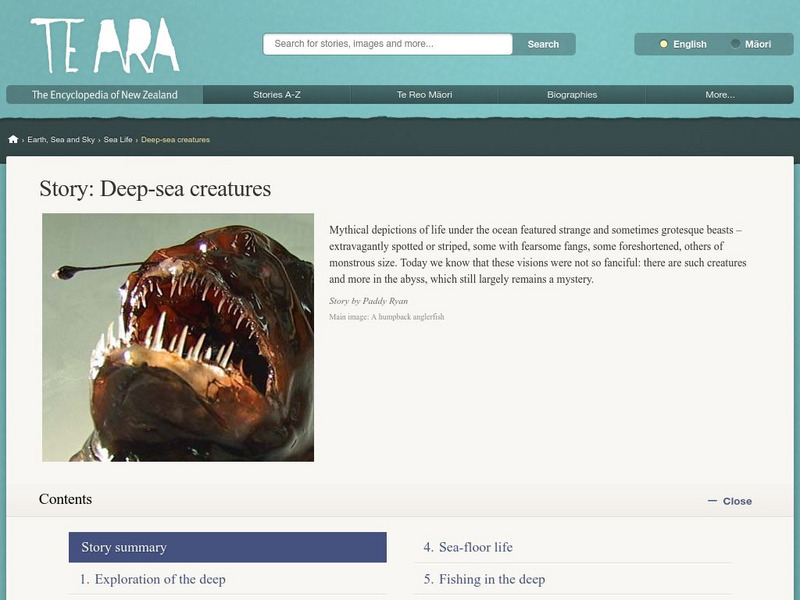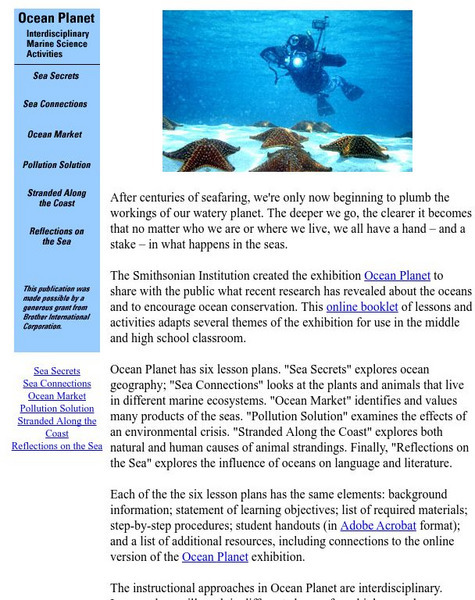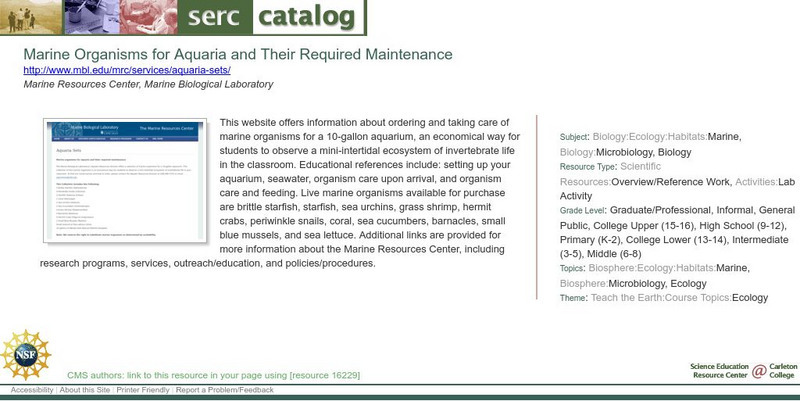Smithsonian Institution
National Museum of Natural History: Ocean Portal, You Navigate
Delight in the fresh colors, sights, and sounds on this dynamic site on the ocean. Major categories consist of Ocean Life & Ecosystems, The Ocean Over Time, Ocean Science, and The Ocean and You. New information on sharks, a slideshow...
Other
Rutgers Marine & Coastal Sciences: Cool Classroom
Students and teachers can explore the work of marine scientists and observe the ocean from their computers. Learn about Rutgers Coastal Ocean Observation Laboratory, discover why oceanography is important, and see what life is like in...
Science Buddies
Science Buddies: Swimming in Acid: Understanding Ocean Acidification
The oceans are a precious natural resource, part of Earth's carbon cycle. But what happens if the oceans absorb too much carbon dioxide? Many scientists are concerned that the increased absorption of carbon dioxide is causing them to...
National Geographic
National Geographic: Human Impacts on the World Ocean
In this instructional activity, students are introduced to the idea that humans have enormous impacts on marine ecosystems and resources, and explore the stakeholders involved.
Science Struck
Science Struck: Facts About the Marine Biome
Describes the characteristics of the marine biome, the plants and animals that live in each of the four ocean zones, coral reefs and estuaries, the climate of the marine biome, and the marine food web.
PBS
Quest: How Ocean Acidification Affects Shelled Organisms
This step-by-step tutorial walks students through the effects of ocean acidification on some shelled marine organisms.
PBS
Pbs.org: Splash & Bubbles: Marine Biology & Social Emotional Learning for Your Classroom
Through play and exploration, Splash and Bubbles demonstrates and celebrates the amazing diversity of life in the ocean, building awareness and appreciation among its young viewers. All the while, viewers are exposed to concepts of...
Wonderville Media
Wonderville: Deep Sea Creatures
We all know that the ocean is home to many beautiful and mysterious creatures. Mysterious cannot begin to describe the fish living in the depths of the ocean. Imagine the kind of creature that lives thousands of feet underwater! Sunlight...
Read Works
Read Works: Marine Biology
[Free Registration/Login Required] A literary text about a boy named Frank who grew up loving the ocean and has dreams of becoming a marine biologist. A question sheet is available to help students build skills in reading comprehension.
BiologyWise
Biology Wise: Marine Biology Facts
Discusses the unique characteristics of the oceans and the many organisms that live in a marine ecosystem.
Careers New Zealand
Kiwi Careers: Marine Biologist
This KiwiCareers site provides information regarding tasks and duties, working conditions, and other career related information for marine biologists.
Other
Encyclopedia of New Zealand: Deep Sea Creatures
Learn about the life forms that dwell deep in the ocean which is divided into four zones. These zones have similar life forms around the world.
American Museum of Natural History
American Museum of Natural History: O Logy: What's the Big Idea? Marine Biology
An introduction to key concepts about the ocean, its ecosystems, and zones. With interactive flash cards that open in new windows to help you learn more.
Smithsonian Institution
Smithsonian Education: Ocean Planet
A series of lesson plans designed to be used with the Smithsonian Ocean Planet exhibit (available online). Lesson topics include marine ecosystems, pollution of ocean water, animal strandings, and literature.
TED Talks
Ted: Ted Ed: Deep Ocean Mysteries and Wonders
Marine biologist, David Gallo, shows why oceans are important while taking the viewer on a voyage into the ocean and exploring the incredible beauty of marine life. [8:24]
NOAA
Noaa: Ocean Facts on Marine Fish Habitats
The depletion of marine fish habitats from NOAA affects more than just the fish - it can affect you too! Learn facts about the importance of habitat preservation for science, and for people like you.
Morning Earth
Biosphere as Place: Ocean Benthic Biomes One
Students investigate the Biology topic of ecosystems. The marine ecosystem tutorial consists of definitions, pictures, and examples of different ocean-benthic biomes.
Science Education Resource Center at Carleton College
Serc: Marine Organisms for Aquaria and Their Required Maintenance
What can you do with an ocean animal aquarium in your classroom? This website offers information about ordering, setting up, and taking care of marine organisms for a 10-gallon aquarium which is a great way for students to observe a...
Woods Hole Oceanographic Institution
Woods Hole Oceanographic Institute: Undergraduate Resources: Marine Careers
What does an oceanographer do and study? This site looks at what marine scientists and students do and the research expeditions they take part in.
National Geographic
National Geographic: Ocean Abiotic Factors
After looking at examples of biotic and abiotic factors in ecosystems, students focus on abiotic factors in marine ecosystems, the physical processes that are involved, and the impact human activities can have on these. Includes handouts...
National Geographic
National Geographic: The World Ocean
A collection of four lessons where students look at the vital role oceans play in our lives, at the hydrosphere and the impact humans have on it, how humans use the oceans and who is responsible for protecting them, and the rationale...
NOAA
Noaa: Ocean Facts on Marine Mammals
The National Oceanic & Atmospheric Administration sponsors this introductory article and related links that tell why marine mammals are valued by the public for their great aesthetic, recreational and economic significance.
Other
Ocean Tracks: Fact or Artifact? Interpreting Patterns in Ocean Tracks Data [Pdf]
Ever wonder where marine animals go? How fast they swim? How deep they dive? Electronic tagging has opened a new window into the world of the open ocean. Ocean Tracks gives you access to data collected by tags on real live migrating...
SEDL
Oceans [Pdf]
This large PDF file integrates math, science, and language into several lessons about characteristics of the oceans. Topics include ocean currents, tides, density, marine life, and pollution.



